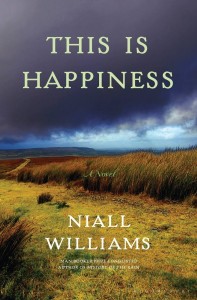At 17, Noel Crowe goes to live with his grandparents in the small rural village of Faha in County Clare, Ireland. Sixty years later he remembers the events of that remarkable season which started on Easter Sunday when the rain stopped.
It rains all the time in Faha. Sometimes it is a hard rain, sometimes a mist, and anything in between. The rain loves the earth in Faha. Noel helps his grandmother, Doady, race out and hang clothes on the line for a ten-minute dry span. So when the sun comes out and stays out, it might be a miracle.
The other remarkable event on Easter Sunday is the arrival of Christy, a middle-aged man who works for “the electrics” and will be staying in Doady and Ganga’s cottage, sharing the loft with Noel. For electricity is finally coming to Faha, bringing not only light to the unsuspecting villagers, but the previously unknown modern world. And Christy has a secret agenda.
I have not enjoyed a novel this much in a long time. It took me a little while to adjust to the pace, somewhat slower than we might be used to, but appropriate for this tale of a time measured in a horse’s clopping hooves or a bicycle ride. There is conflict and suspense, too, as in any story, and mysteries to be explored. Conflict doesn’t have to be a battle or a car chase; it can grow out of miscommunication and missed connections.
Through Noe, as he’s known, we enter into the life of the village: the doctor with his three beautiful daughters, the young priest whose well-known goodness leads him keeping the church door unlocked so thieves don’t have to break in. There’s a forge rather than a hardware store and of course the farms.
In the fields, cattle, memories dissolved by so many liquid mornings, noons and nights, had forgotten they dreamed of April grass and, by a clemency reserved for those who live placid in a perpetual now, standing in a green sweetness forgot the cold muck-grazing of February.
There’s a lot of gentle humor here. Williams describes the eccentric villagers with compassion and often a deft turn of phrase. In such a small village people must get along, no matter how oddly their neighbors behave. Noe and Christy take to riding Doady and Ganga’s bikes around to pubs—where of course it’s only polite to have a bottle of stout or three—in search of the legendary Irish musician Junior Crehan.
But it’s the language that lays a spell on me. Writers are often advised to avoid too much dialect because it can be challenging for the reader. I once actually had to give up on a novel written in broad Glaswegian dialect after only a few pages. Instead we are advised to find a way to suggest the lilt of an accent through the music of our sentences: the choice of words and the way we arrange them.
Williams is a master at this, and rewards careful study. Every now and then he’ll throw in an Irish phrase, but mostly it is simply the music. The villagers’ memory is embedded in story, stories told over and over, that become the fabric of their share life.
The known world was not so circumscribed then nor the knowledge equated with facts. Story was a kind of human binding. I can’t explain it any better than that. There was telling everywhere. Because there were fewer sources of where to find out anything, there was more listening.
And the other part of the binding is the old songs, traditional Irish music:
Gilbert Clancy… said the pipes recalled what couldn’t be remembered, the old bard times, and in their melancholy and joy was this world and another.
I loved being a part of this community for the space of this novel and will be looking for more of Williams’s books.
Sometimes we like novels or appreciate or even admire them. What novel have you read recently that you simply enjoyed?
